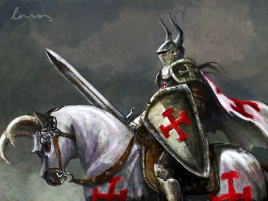Is Anders Breivik a `Christian’ terrorist?
By David Gibson | Jul 29, 2011

The mass murders in Oslo have raised a host of agonizing questions, but few have such an ancient lineage and contemporary resonance as whether Anders Behring Breivik, the right-wing extremist behind the attacks that killed 76 Norwegians last Friday (July 22), is a Christian.
Breivik claimed that he is a Christian in various forums, but most explicitly and in greatest detail in the 1,500-page manifesto he compiled over several months and posted on the Internet.
“At the age of 15 I chose to be baptised [sic] and confirmed in the Norwegian State Church,” the 32-year-old Breivik wrote. “I consider myself to be 100 percent Christian.”
But he also fiercely disagrees with the politics of most Protestant churches and the Roman Catholic Church.
“Regarding my personal relationship with God, I guess I’m not an excessively religious man,” he writes. “I am first and foremost a man of logic. However, I am a supporter of a monocultural Christian Europe.”
Breivik fashions himself a “cultural Christian” and a modern-day crusader in a resurrected order of the medieval Knights Templar, riding out to do battle against squishy “multiculturalism” and the onslaught of “Islamization”—and to suffer the glory of Christian martyrdom in the process.
Not surprisingly, conservative pundits who share some of Breivik’s views and also consider themselves Christians quickly sought to distance themselves from Breivik by declaring, as Bill O’Reilly did on Fox News, that “Breivik is not a Christian.”
“That’s impossible,” O’Reilly said Tuesday. “No one believing in Jesus commits mass murder. The man might have called himself a Christian on the ‘net, but he is certainly not of that faith.”
O’Reilly blamed the “liberal media” for “pushing the Christian angle” in order to demean Christians like himself. But O’Reilly’s point was taken up by any number of commentators and religion scholars.
Mathew N. Schmalz, a professor of religious studies at the College of the Holy Cross, wrote in a Washington Post column that Breivik’s vision “is a Christianity without Christ” because the attacker rejected a personal relationship with Jesus.
Writing in The Guardian, Andrew Brown wrote that “even in his saner moments (Breivik’s) ideology had nothing to do with Christianity but was based on an atavistic horror of Muslims and a loathing of `Marxists,’ by which he meant anyone to the left of Genghis Khan.”
Arne H. Fjeldstad, a longtime Norwegian journalist and Lutheran minister of the Church of Norway, wrote a lengthy analysis of Breivik’s references to Christianity and also concluded that “his view is framed entirely by politics, with strong political and cultural opinions, which also include religious views.”
“Breivik’s religious position is rather distant from any Christian faith commitment,” Fjeldstad wrote.
But others pushed back against such a carefully cordoned-off interpretation of Breivik’s faith, or Christianity itself.
“If he did what he has alleged to have done, Anders Breivik is a Christian terrorist,” Boston University religion scholar Stephen Prothero wrote on CNN.com.
“Yes, he twisted the Christian tradition in directions most Christians would not countenance. But he rooted his hate and his terrorism in Christian thought and Christian history, particularly the history of the medieval Crusades against Muslims, and current efforts to renew that clash.”
Read more: http://www.religionnews.com/index.php?/rnstext/is_anders_breivik_a_christian_terrorist/















